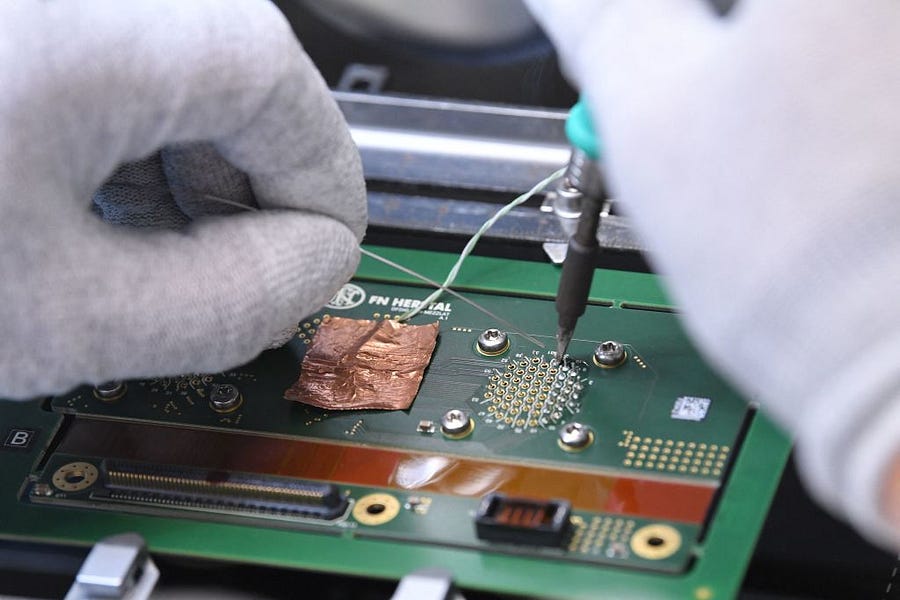Good morning. Congress is in this week, with members planning a busy final sprint so they can skip town for August recess.
Senate Aims to Pass Chips Investment Package
After more than a year of work, senators could approve $52 billion in funding to boost semiconductor chip manufacturing in the United States as soon as this week.
Lawmakers hope the legislation will alleviate struggling supply chains and bring manufacturing jobs to the United States. The new version of the bill came together quickly last week. Republicans quit conference committee talks earlier this month after learning Democrats were working on an unrelated budget reconciliation measure with their priorities on drug pricing, among other issues. With an August recess quickly approaching and the November midterms pressuring the congressional calendar, senators rallied around a slimmer version of the chips package in the hope that it can become law.
The bill’s aim is to expand the U.S. chip supply, critical to many technologies and products. It also includes tens of billions of dollars for scientific research, tax credits for manufacturing, a full NASA reauthorization, and an array of educational initiatives for science, engineering, technology, and math programs.
Senate Majority Leader Chuck Schumer said Monday night that a vote on final passage of the sweeping legislation could come in the Senate as soon as Tuesday or Wednesday. It is likely to win enough support to advance: 64 senators backed a procedural vote to allow consideration of the measure last week, enough to overcome the Senate’s 60-vote threshold.
“We are on the brink of closing the book, passing these critical investments into law,” Schumer said in a floor speech Monday.
“The 21st century will be won or lost on the battleground of technological innovation,” Schumer added. “This is perhaps the most competitive era in human history. Will American workers, will American tech, will American ingenuity shape the world over the next hundred years in the same way that we’ve shaped it in the last hundred?”
Supporters of the bill argue it will jumpstart American competitiveness and enable breakthroughs in fields ranging from biometrics and artificial intelligence to fusion energy and high intensity laser research. Some lawmakers oppose it on account of its funding for the semiconductor manufacturing sector: They make the case that the money is an unwarranted corporate handout, or that there are not strong enough guardrails on how companies might use the money.
House leaders have signaled they will bring the bill forward for consideration in that chamber quickly if the Senate passes it. At an event last week, House Speaker Nancy Pelosi said the package could reach President Joe Biden’s desk by the end of this week. She added that Democrats “feel very confident” about finishing the bill, and she anticipates support from some Republicans, although the exact numbers weren’t certain.
“I don’t know how many we get, but it will be bipartisan,” she said.
If You Wondered …
We’ve written to you in this newsletter several times over the past year about an effort to tangibly help Uyghurs and other groups harmed by China’s genocide in Xinjiang.
The bill, which would make it easier for Uyghurs and others fleeing Xinjiang to apply for refugee status in the United States, passed in the House version of the China competition package. It’s a logical step to take as Uyghurs who have escaped are still facing China’s repression in North African and Middle Eastern countries. And it’s an obvious step to take for another reason—the American government has officially said these groups are experiencing genocide.
Republican senators opposed it during conference committee talks, taking issue with all of the House bill’s immigration provisions.
That opposition stuck. The refugee item didn’t make it into the new version of the competition bill the Senate is considering this week.
Remember, though: President Biden could make the change prioritizing these refugees without Congress taking action. Read more here.
Pelosi’s China Standoff
Speaker Pelosi has a decision to make: Proceed with her planned trip to Taiwan and face down the Chinese government, or delay it due to concerns about how China could react.
The deliberations spilled into public view last week when Biden told reporters the American military believes the timing of the trip isn’t good. Pelosi has not officially confirmed her travel plans, but reports suggest she could go to the island in August. She pushed back a trip in April because she tested positive for coronavirus.
Pelosi said last week after Biden’s remarks that she doesn’t ever discuss her travel plans due to national security concerns. She added that she hadn’t spoken to Biden at that point, but “I think what the president was saying is maybe the military was afraid our plane would get shot down or something like that by the Chinese.”
“I don’t know exactly,” she added.
Pelosi said during the same press conference that “it’s important for us to show support for Taiwan.”
AP’s Seung Min Kim and Matthew Lee have new reporting on the Biden team’s thinking:
The U.S. officials said the administration doubts that China would take action against Pelosi herself or try to sabotage or otherwise interfere with a visit, but they said the administration does not rule out the possibility that China could escalate provocative overflights of military aircraft in or near Taiwanese airspace and naval patrols in the Taiwan Strait should the trip take place. The officials also said the administration does not preclude that China might also step up its actions outside the immediate area of Taiwan as a show of strength, thus possibly expanding military operations in contested areas of the South China Sea.
On Monday, the Chinese government publicly confirmed it is warning U.S. officials about an elevated response compared to other congressional trips to Taiwan.
“We are seriously prepared,” Chinese government spokesman Zhao Lijian said Monday of a potential Taiwan visit by Pelosi. He didn’t provide details about how China would respond, but said, “If the U.S. side is bent on going its own way, China will take strong measures to resolutely respond and counteract.”
The Chinese government claims the island—which is democratic and governs itself—as part of China. The Chinese government never takes lightly supportive gestures or visits to Taiwan from leading Americans, but officials are especially sensitive right now. China faces internal economic challenges and international pressure over its gross human rights abuses. And Chinese President Xi Jinping will convene a major party meeting in November. The Biden administration reportedly views the intervening months as particularly delicate.
The showdown is prompting other lawmakers to voice their stances on how Pelosi should react. Republican lawmakers are broadly urging her to proceed with the trip. Some have also criticized Biden for mentioning the American military’s concerns publicly.
“He’s effectively allowing the Chinese Communist Party to have a veto over the travel plans of members of Congress, and in the process weakening our entire deterrent posture with respect to Taiwan,” Wisconsin GOP Rep. Mike Gallagher said last week.
Nebraska Republican Sen. Ben Sasse also issued a statement Monday urging Pelosi to stick to her travel plans.
“Speaker Pelosi should go to Taiwan and President Biden should make it abundantly clear to Chairman Xi that there’s not a damn thing the Chinese Communist Party can do about it,” Sasse said. “No more feebleness and self-deterrence. This is very simple: Taiwan is an ally and the Speaker of the House of Representatives should meet with the Taiwanese men and women who stare down the threat of Communist China.”
On the Floor
While the Senate debates the China competition bill, the House has a lot on the docket. A full list is available here. Among those, members will vote on legislation limiting ownership of big cats (yes, in the vein of Tiger King).
Key Hearings
The Senate Judiciary Committee is holding a hearing this morning on protecting police officers. Information and video here.
A Senate Judiciary subcommittee will meet this afternoon for a hearing on decriminalizing cannabis on the federal level. Information and livestream here.
The Senate Foreign Relations Committee will meet Wednesday morning for a hearing on American national security and ensuring global leadership. Information and livestream here.
The House Oversight and Reform Committee will hear testimony from gun manufacturers and experts in a hearing Wednesday morning on the role of the firearms industry in American gun violence. The hearing had been scheduled for last week but was postponed. Information and livestream here.
The Senate Environment and Public Works Committee will meet Wednesday morning to examine policies supporting carbon capture technology. Information and livestream here.
The House intelligence panel will hold a hearing Wednesday morning on the threats posed by foreign commercial spyware. Information and livestream here.
Officials from the U.S. Agency for International Development will testify before the House Foreign Affairs Committee Wednesday morning about global food security. The hearing comes as Russia’s brutal war in Ukraine endangers essential food products Ukraine normally exports. Information and livestream here.
A House Homeland Security subcommittee will hold an oversight hearing Wednesday afternoon to examine how Customs and Border Protection is using facial recognition technology. Information and livestream here.
The House panel dealing with space and aeronautics will hold a hearing Thursday morning on cybersecurity issues relating to space systems. Information and livestream here.






Please note that we at The Dispatch hold ourselves, our work, and our commenters to a higher standard than other places on the internet. We welcome comments that foster genuine debate or discussion—including comments critical of us or our work—but responses that include ad hominem attacks on fellow Dispatch members or are intended to stoke fear and anger may be moderated.
With your membership, you only have the ability to comment on The Morning Dispatch articles. Consider upgrading to join the conversation everywhere.